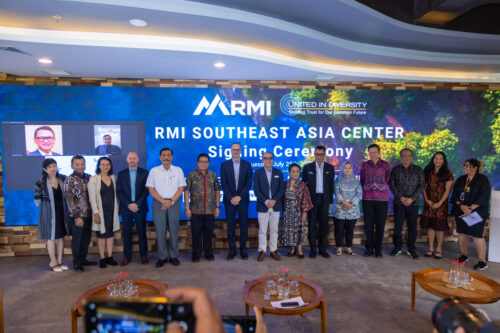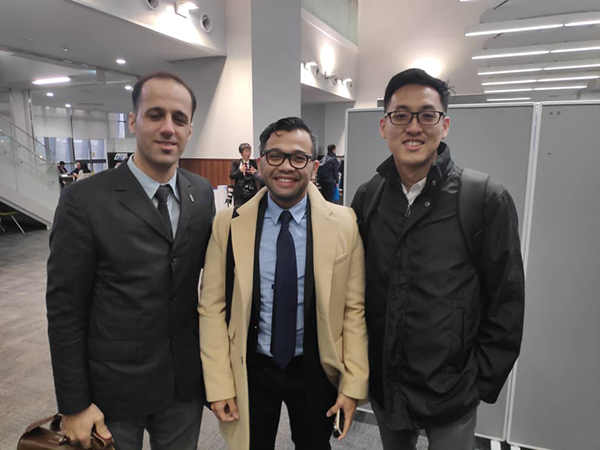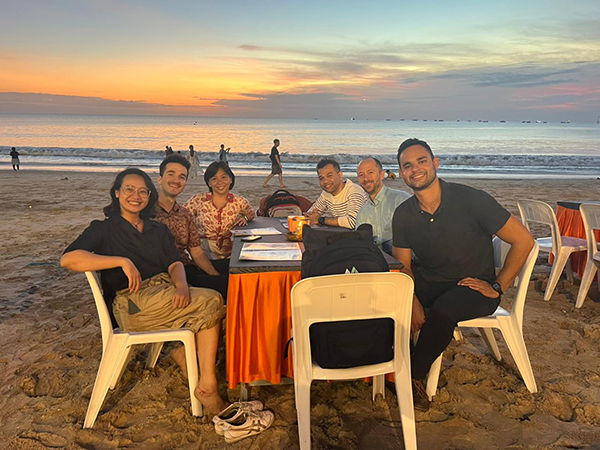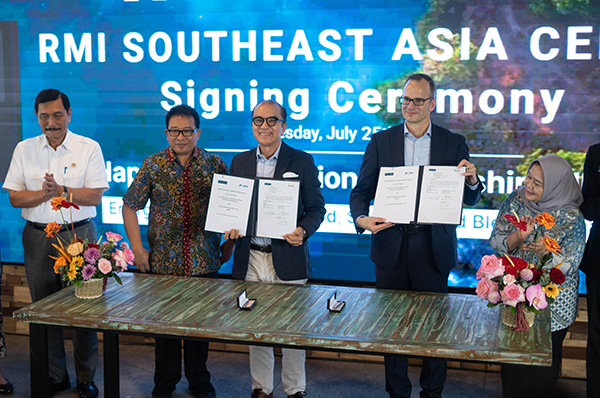
Insight from Indonesia: Just Energy Transitions Hinge on Well-Equipped Energy Leaders
Jakarta-born Rizky Fauzianto explores RMI’s work supporting Indonesia in delivering on an unprecedented $20 billion energy transition pledge.
Life in Indonesia is vibrant and bustling, with 260 million people calling it home. The population of Indonesia is nearly equivalent to that of the United States despite its land mass being only one-fifth the size.
I was born and raised in Jakarta, a melting pot cosmopolitan city that captures Indonesia’s cultural diversity. The strengths and growth opportunities of the country I love have shaped the way I look at the world.
I have also seen incredible changes to Jakarta since my childhood. The Indonesian economy has grown rapidly in the past two decades, with GDP increasing by about 5 percent per year on average. Energy use, primarily supplied by fossil fuels, has followed. Economic growth has resulted in 60 percent more energy being consumed in 2020 than in 2000. Today, over 65 percent of Indonesia’s electricity is provided by 34 gigawatts (GW) of coal-fired power plants, and an additional 13.8 GW of coal is planned for future development. The greenhouse gas (GHG) emissions from the country’s energy sector were around 600 million metric tons in 2021, placing Indonesia among the top 10 largest emitters in the world.
As an emerging country that is growing rapidly in population and energy demand, Indonesia’s utility transition — including the early termination of coal-fired power plant operations and the shift to clean energy — is critical to reducing GHG emissions and air pollution. I am excited to work at RMI to address the problem, as this transition will also open up opportunities for investment in alternative energy sources, increase the country’s energy sustainability, and improve the quality of people’s lives.
Being the Change We Wish to See in the Energy Transition
Indonesia is the largest economy in Southeast Asia and represents opportunities and challenges that are found throughout the region in terms of fossil fuel dependency, grid connectivity, and different levels of development. Southeast Asia is home to 660 million people and would rank as the sixth largest economy in the world if it were a single country. By 2030, it is projected to be the fourth largest economy in the world, with $4.6 trillion in GDP and a total population of 722 million.
While the region accounts for around 5 percent of global energy demand and its greenhouse gas emissions rank third in the world, per capita emissions are only 2.58 tons as of 2021, much lower than the global average of 4.5 tons. The region’s carbon emissions are projected to climb to 3,679 million metric tons by decade’s end, increasing by more than two-thirds between 2015 and 2030.
In short, we cannot meet global energy targets without establishing and meeting targets in Southeast Asia. Getting there will require strategic collaboration both in the region and internationally.
Crafting Our Strategic Approach to Address Big-Picture Realities
RMI’s work in Southeast Asia centers on supporting an accelerated and just energy transition, with a focus on Indonesia, the Philippines, and Vietnam. These three countries are the most populous in the region, and they all have strong GDP growth and high-carbon emissions. We focus on supporting seismic shifts in clean power generation and consumption, electric transportation, and industrial decarbonization, while ensuring those shifts positively and equitably impact communities by sparking new green jobs and economic prosperity.
I am lucky that many years ago, after studying for my master’s degree in Germany, I had the opportunity to start working on the energy sector, supporting Southeast Asia in achieving a regional target of 23 percent renewable energy by 2025, which led me to receive the ASEAN Excellence in Energy Management by an Individual award in 2022 for my contribution to clean energy development in all eleven ASEAN countries. This includes Brunei Darussalam, Cambodia, Indonesia, Lao PDR, Malaysia, Myanmar, The Philippines, Singapore, Thailand, Timor Leste, and Vietnam. I am happy to continue contributing to the region and my country in my current role on the RMI Southeast Asia team.

Our approach centers national partnerships and in-country staff to help build a deep understanding of both the strengths and growth opportunities of the energy transition in the region. The RMI Southeast Asia team is growing to 11 staff this month, with four team members based in Indonesia, one in the Philippines, and one in Vietnam.

Supporting One of the Largest Clean Energy Pledges the World Has Ever Seen
Indonesia is now on a transformative journey with the largest clean energy transition pledge in history. Last fall, a cumulative $20 billion was committed to accelerate Indonesia’s clean energy transition through the nation’s Just Energy Transition Partnership (JETP), supported by the International Partners Group, which is spearheaded by the United States and Japan. Within this declaration, Indonesia has set ambitious goals of achieving nearly 34 percent renewable energy integration and aiming for net-zero emissions by 2050.
RMI is supporting the Government of Indonesia as a technical expert under the JETP Working Groups to define a clear path to achieving these ambitious goals. Through this work, RMI has also identified financial, technical, and policy barriers to deploying energy projects at the pace and scale needed to deliver on Indonesia’s commitment. Meanwhile, RMI supports state-owned enterprises in Indonesia (PT SMI, PT Bukit Asam, and PLN) in assessing transition options and opportunities for financing the retirement of early coal-fired power plants.
Boosting Energy Leadership to Address Coal-to-Clean-Energy Barriers
In July, we formalized a local partnership with United in Diversity (UID) to launch the Happy Energy Action Leadership (HEAL) program. Through the HEAL program, we will equip an initial 30 to 50 stakeholders across various sectors with the critical skills and expertise needed for Indonesia to deliver on its ambitious clean energy transition and serve as a leading example in the region.
At its essence, the HEAL program is designed to empower Indonesian leaders to design and implement the financial, technical, and policy solutions critical to achieving the vision outlined within the JETP. HEAL will also foster collaboration and synergy among local and national stakeholders. By cultivating shared learning, leadership, and technical expertise, HEAL aims to ignite collective action in the implementation of energy transition projects, laying the groundwork for a sustainable future.

Deep technical expertise is necessary to empower Indonesian energy leaders with the knowledge and change models that will fast-track the clean energy transition. RMI is excited to support the development of the HEAL program, leveraging our experience working with global energy leaders through RMI’s Energy Transition Academy and our deep technical knowledge in preparing and implementing energy projects. We are committed to supporting Indonesia in delivering on its bold, historic climate commitments.
What’s Next?
Collaborating on a more sustainable future for the region doesn’t stop in Indonesia. In fact, other nations are already making large strides. RMI is proud to support efforts including offshore wind deployment in the Philippines and the development of utility transition strategies in Vietnam.
Follow our resilience newsletter to stay up to date with exciting regional developments sparking local and global prosperity.